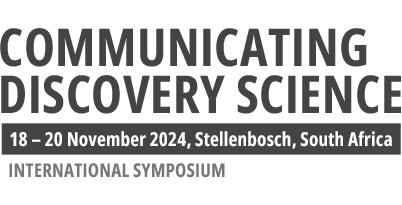Speaker feature
Insights from Kavli Foundation Leaders: Brooke Smith and Lauren Budenholzer
Basic, or foundational, science has historically been underrepresented in science communication and public engagement efforts, which typically tend to focus more on applied science. Addressing this gap, the Science Public Engagement Partnership (SciPEP) – a collaboration between the Department of Energy Office of Science and the Kavli Foundation – has taken significant strides to enhance the communication of basic science to diverse audiences including non-scientists.
Since 2019, SciPEP has hosted conferences, webinars, and workshops aimed at engaging diverse audiences in basic science. These efforts culminated in the Communicating Discovery Science Symposium, held from 18 to 20 November 2024, in Stellenbosch, South Africa. Organised by the Stellenbosch University Centre for Research on Evaluation, Science and Technology (CREST) with support from The Kavli Foundation, the event provided a platform for experts to share insights and strategies for advancing science communication with an emphasis on basic science communication.
As the symposium wrapped up, Brooke Smith, Director of Science and Society at the Kavli Foundation, and Lauren Budenholzer, Science and Society Specialist, reflected on the progress made since 2019 and highlighted questions for the future.
Commenting on the development of basic science communication since 2019
Brooke: “I’m incredibly excited and happy about what’s happened and where it’s going. When we started this endeavour four or five years ago, our aspirations were to illuminate what’s different, if anything, about communicating basic discovery science. The hope was to help anyone identifying as a basic scientist to communicate more effectively.
The journey has taken us in unexpected directions. We’ve been reflexive and thoughtful about it, guided by what we’ve learned from the community. We never felt that communicating basic science should be treated as a separate endeavour from communicating science as a whole. However, shining a light on it has elucidated some key considerations for those working in this field.
My hope is that these conversations will integrate into broader discussions about science communication. After the past three days, I truly believe that will happen, which is really exciting.”
What are your key takeaways from the symposium?
Brooke: “A key idea we’ve been exploring is that strategic science communication—broadly defined—encompasses all forms of science communication. Basic science doesn’t operate under separate norms or realities.
There’s a continuum between basic and applied science, as illustrated by many presentations at the workshop. Talks with an applied focus often demonstrated strategic impact, while those without such elements required us to think harder about science communication’s universal characteristics and rules.
Another important theme is the tension in the field’s diversity. While divergence can make it challenging to establish uniform expectations, it also makes the field special. The influx of new people and ideas diversifies the work and energises the community.”
Lauren: “As someone with a background in basic science, I often found it frustrating to be told to highlight the ‘utility’ of my research when communicating it. Mónica’s [Mónica Feliú Mójer, Director of Public Engagement with Science at Ciencia Puerto Rico] perspective on relevance as connection resonates deeply with me. It offers exciting possibilities for understanding what relevance means to different audiences. I’m eager to see how this concept continues to evolve.”
Questions to explore in the future
Brooke: “The concept of relevance is ripe for further exploration. While many are already making science relevant in diverse ways, these contributions often go unrecognised in broader conversations. Incorporating elements like curiosity and awe into science communication is another untapped opportunity. We could draw more from psychological research in these areas by collaborating across disciplines and breaking down silos.”
Lauren: “Social science questions are primed for deeper exploration. Sarah Yeo’s [Sara K. Yeo, Associate Professor, Department of Communication, University of Utah] insights report offers a great starting point for a research agenda [see reference below]. While these questions may evolve over time, they offer a valuable snapshot of what’s currently possible.”
Broadening horizons
Brooke: “Hosting workshops in different countries is crucial to fostering diverse participation. This was our first time holding a Kavli science communication workshop in Africa, and it has been a profoundly enriching experience. Marina [Senior Science Communication Researcher at CREST, Prof Marina Joubert] has been an exceptional advocate for the region, but hearing directly from those working on these projects has been invaluable. I am deeply grateful for everyone’s generosity and the opportunity to learn from their work, which shapes how we view the world.”
As the field of science communication continues to grow, conversations like these illuminate its complexities, challenges, and possibilities. By embracing diverse voices and perspectives, the community can forge a more inclusive and impactful future.
Further reading
Yeo, Sara K. “We Have More Questions than Answers. Collaboration Is the Way Forward.” In Insights and Practical Considerations for Communicating Basic Science, [46-48]. SciPEP. Report for the Department of Energy Office of Science and The Kavli Foundation as part of the Science Public Engagement Partnership, 2024. https://doi.org/10.17605/OSF.IO/4KGQF.
Senior Science Communication Researcher at CREST, Prof. Marina Joubert and Brooke Smith, Director of Science and Society at the Kavli Foundation at the November Communicating Discovery Science Symposium.
The symposium brought together experts to share insights and strategies for advancing science communication. The event was one of the recent initiatives of the Science Public Engagement Partnership (SciPEP).
Session recording
Watch the session: The SciPEP journey to date – outputs, outcomes and future directions



